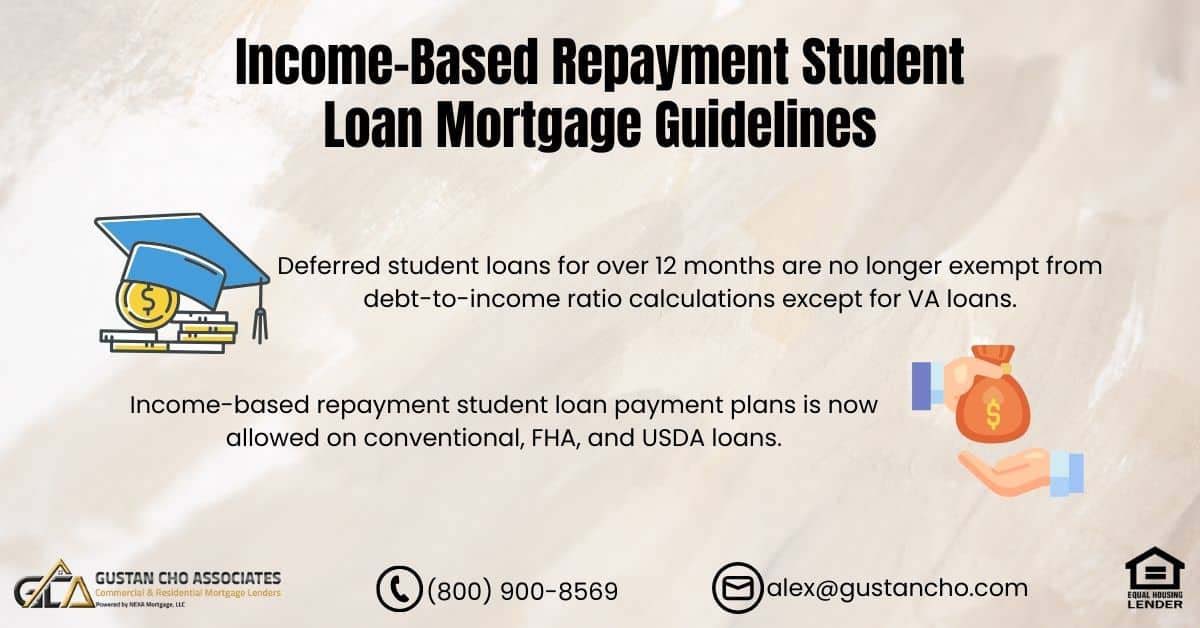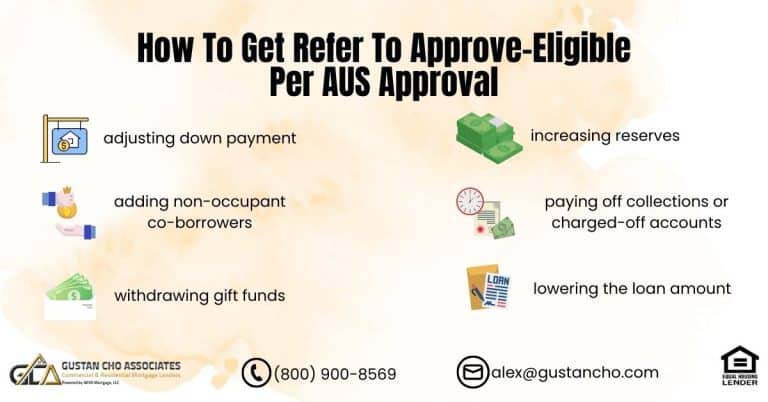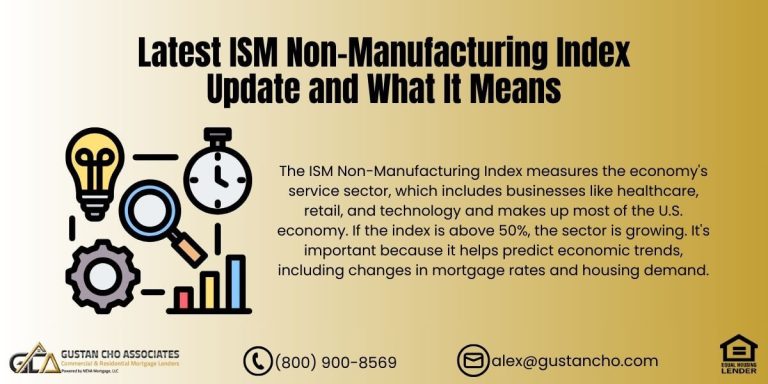This guide aims to understand Income-Based Repayment Student Loan Mortgage Guidelines clearly. The daunting task of outstanding student loans presents a substantial challenge for numerous Americans, especially those navigating the intricate process of qualifying for a home mortgage.
In homebuying, where financial considerations are pivotal, adopting income-based repayment measures becomes increasingly significant. Notably, governing bodies such as HUD, USDA, Fannie Mae, and Freddie Mac have taken noteworthy steps to facilitate this process.
According to insights provided by Sonny Walton, a seasoned professional holding dual licenses as a realtor and loan officer at Gustan Cho Associates, these entities now endorse the utilization of income-based repayment when assessing the debt-to-income ratio for FHA, USDA, and VA loans.
This evolution in policy is particularly noteworthy for aspiring homeowners, as it opens up avenues for a more nuanced and realistic approach to mortgage qualification.
The acknowledgment of income-based repayment as a valid metric for evaluating debt-to-income ratios signifies a shift towards a more inclusive and accommodating system, recognizing the financial landscape many borrowers face while pursuing higher education. Understanding these policy shifts and implications can prove invaluable as individuals navigate the complex landscape of student loans and homeownership.
This guide gives Individuals a comprehensive understanding of the nuances involved in home financing. It provides insights that empower them to make informed decisions about their financial future.
Government and conventional loans have their individual agency mortgage guidelines when it comes to student loans. Deferred student loans for over 12 months are no longer exempt from debt-to-income ratio calculations except for VA loans.
Many veterans have the advantage of excluding deferred student loans that have been deferred for more than 12 months when applying for VA loans. In contrast, conventional loans specifically accept Income-Based Repayment (IBR) payments. It’s important to note that individuals seeking conventional loans with significant outstanding student loans under income-based repayment must meet the qualification criteria for conventional loans.
Income-Based Repayment Student Loan Guidelines
Income-based repayment, called IBR Payments, is a viable option for borrowers with conventional, FHA, and USDA loans. However, it’s crucial to know that VA loans do not accommodate income-based repayment. Mortgage lenders follow Fannie Mae and Freddie Mac’s income-based repayment guidelines to determine eligibility and terms for conventional loans.
These guidelines significantly shape the approach to managing student loan debt within the context of mortgage applications. As per John Strange, a senior loan officer at Gustan Cho Associates, it is important to understand these guidelines to ensure the feasibility of incorporating income-based repayment plans into mortgage arrangements.
When it comes to the intricacies of obtaining a mortgage, especially regarding student loans, borrowers must have a solid understanding. John Strange’s insights emphasize this point. The guidance offered emphasizes the availability of income-based repayment across different loan types and the limitations, particularly for VA loans.
As borrowers explore their options and seek to align their financial strategies with mortgage requirements, staying informed about these guidelines ensures a more informed decision-making process.
Many borrowers with advanced degrees have high-balance student loans. Medical doctors, dentists, chiropractors, podiatrists, pharmacists, lawyers, and educators often have student loan balances exceeding $100,000. Income-based repayment student loan payment plans is now allowed on conventional, FHA, and USDA loans.
Many doctors and dentists find themselves burdened with student loans exceeding $500,000. To address this financial challenge, HUD, the overseeing body of FHA, mandates that 0.05% of the outstanding loan balance be considered the borrower’s hypothetical debt unless they make fully amortizing monthly payments.
Notably, the VA Loans program stands out by exempting deferred student loans that have been deferred for longer than 12 months. This exception makes VA Loans a distinctive option for professionals in the medical field seeking mortgage solutions tailored to their unique financial circumstances.
In this blog, our focus will center on Income-Based Repayment (IBR) and explore the specific student loan guidelines applicable to various mortgage programs beyond the VA Loans. Understanding the nuances of IBR and how it interacts with different loan options is crucial for professionals managing substantial student debt.
We aim to offer helpful information to doctors, dentists, and others dealing with student loan challenges while exploring different mortgage options.
Get a Strong Pre-Approval That Counts Your Student Loans the Right Way
A real pre-approval looks at your student loan balance, payment type, and program rules upfrontFannie Mae-Freddie Mac Student Loan Guidelines
Fannie Mae and Freddie Mac Guidelines permit using Income-Based Repayment (IBR) Payments for student loans. Among mortgage programs, only Conventional Loans accommodate the use of income-based repayment. Ensuring that the IBR Payment is reported on all three credit bureaus is essential.
IBR Payments that do not report on credit reports, lenders can collect documentation from borrowers and do a rapid-rescore. Rapid rescore expedites correct information to be reported on all three credit bureaus.
Individuals with significant student loan balances may find Conventional Loans more suitable. The specific loan balance is not a determining factor. For instance, borrowers can have a $20-per-month IBR payment for a $300,000 outstanding student loan balance. Additionally, even income-based payment with zero balances are acceptable for Conventional Loans.
Income-Based Repayment Student Loan Mortgage Guidelines: FHA And USDA Student Loan Mortgage Guidelines
FHA and USDA share identical guidelines for mortgages involving student loans. The guidelines for FHA and USDA mortgages regarding student loans specifically acknowledge the acceptance of Income-Based Repayment and fully amortized payments over an extended term.
To qualify for an extended hypothetical payment, obtaining written confirmation from the student loan provider indicates a fully monthly amortized payment over an extended term is essential. If the borrower cannot secure such documentation, lenders must utilize 1.0 percent of the outstanding student loan balance as a monthly hypothetical debt.
It is no longer permissible to have deferred student loans extending beyond 12 months on FHA and USDA loans. In cases where borrowers have substantial student loan balances, opting for conventional loans may be necessary.
VA Mortgage Guidelines on Student Loans
The VA loan program stands out by offering a distinct provision that exempts deferred student loans with a deferral period exceeding 12 months from being factored into debt-to-income ratios (DTI).
This means borrowers with deferred student loans can benefit from a more favorable DTI calculation. Specifically, any student loans deferred for longer than 12 months are granted an exemption from the DTI calculations, providing borrowers with added flexibility and potentially increasing their eligibility for VA loans.
- Take 5% of the outstanding student loan balance
- Divide that figure by 12 months
- The yielding number is the hypothetical monthly payment used by mortgage underwriters.
n the other hand, the guidelines for other loan programs differ in their treatment of student loans, particularly those following Fannie Mae and Freddie Mac standards. These guidelines allow for considering Income-Based Repayment (IBR) amounts on conventional loans.
This means borrowers with student loans under IBR plans may include those payments when calculating their DTI for conventional loans, potentially influencing their loan eligibility and affordability. It’s worth noting that this distinction underscores the importance of understanding the unique features and requirements of different loan programs.
While the VA loan program offers specific advantages for those with deferred student loans, borrowers exploring conventional loans must navigate the guidelines set by Fannie Mae and Freddie Mac, where IBR payments for student loans are permissible. This nuanced understanding empowers individuals to make informed decisions based on their financial circumstances and loan preferences.
Confused How IBR Payments Affect Your DTI?
FHA, VA, and conventional loans all look at student loans differently—especially income-based repaymentQualifying For A Mortgage With Lender With No Overlays and Experts on Non-QM Loans
Borrowers who need to qualify for home loans with high student loans, please get in touch with us at Gustan Cho Associates at 800-900-8569 or text us for a faster response. Or email us at alexgustancho.com. Gustan Cho Associates is a mortgage company licensed in multiple states with no lender overlays on government and conventional loans. Not only are we known for not having any lender overlays on FHA, VA, USDA, and Conventional loans.
Gustan Cho Associates has a national reputation for being a one-stop mortgage company with dozens of non-QM and alternative mortgage loan programs. Gustan Cho Associates have dozens of non-QM wholesale lending partners.
Some of our popular non-QM mortgage loan programs include bank statement mortgages, asset-depletion loans, fix and flip loans for real estate investors, non-QM mortgages one day out of bankruptcy and foreclosure, and many other unique and alternative loan programs for owner-occupant homes, second homes, and investment properties.
The support and licensed personnel at Gustan Cho Associates is available seven days a week, evenings, weekends, and holidays. Again, contact Gustan Cho Associates at 800-900-8569 or text us for a faster response. Or email us at alex@gustancho.com.
FAQ: Income-Based Repayment Student Loan Mortgage Guidelines
-
1. What is the significance of the Income-Based Repayment (IBR) in the context of mortgage qualification? Income-Based Repayment (IBR) plays a crucial role in the qualification process for home mortgages, especially for those burdened with outstanding student loans. It is a method endorsed by governing bodies like HUD, USDA, Fannie Mae, and Freddie Mac to assess debt-to-income ratios for various loan programs.
-
2. How have government agencies evolved their policies regarding IBR and mortgage eligibility? Entities such as HUD, USDA, Fannie Mae, and Freddie Mac have embraced the utilization of income-based repayment when evaluating debt-to-income ratios for FHA, USDA, and VA loans. This shift in policy aims to provide a more nuanced approach to mortgage qualification, particularly beneficial for aspiring homeowners.
-
3. Are VA loans exempt from considering deferred student loans in debt-to-income ratios? Yes, the VA loan program uniquely exempts deferred student loans deferred for longer than 12 months from being factored into debt-to-income ratios. This exemption enhances the flexibility and eligibility of borrowers applying for VA loans.
-
4. Do conventional loans, including Fannie Mae and Freddie Mac, accept IBR payments for student loans? Yes, Fannie Mae and Freddie Mac guidelines permit the inclusion of Income-Based Repayment (IBR) payments for student loans on conventional loans. This is in contrast to the VA loan program, which does not accommodate IBR payments.
-
5. How does IBR impact mortgage qualification for professionals with high-balance student loans, such as doctors and dentists?Professionals with significant student loan balances, like doctors and dentists, can explore conventional loans that allow for IBR payments. The specific loan balance is not a determining factor, making conventional loans a viable option for those with substantial student debt.
-
6. Can deferred student loans extending beyond 12 months be considered for FHA and USDA loans? No, it is no longer permissible to have deferred student loans extending beyond 12 months on FHA and USDA loans. Borrowers with substantial student loan balances may need to consider conventional loans in such cases.
-
7. How does the VA loan program calculate hypothetical monthly payments for deferred student loans? For VA loans, the calculation involves taking 5% of the outstanding student loan balance and dividing that figure by 12 months. This resulting number represents the hypothetical monthly payment used by mortgage underwriters.
-
8. What support does Gustan Cho Associates provide for borrowers with high student loans? Gustan Cho Associates is a mortgage company with expertise in government and conventional loans. They have a national reputation for having no lender overlays and offer various non-QM and alternative mortgage loan programs to cater to the diverse needs of borrowers, including those with high student loan balances.
This blog about Income-Based Repayment Student Loan Mortgage Guidelines was updated on February 22, 2024.










